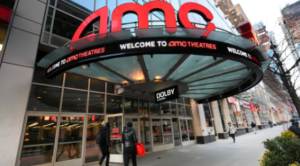
AMC Entertainment witnessed a 37% surge in shares on Monday following a court ruling that blocked their preferred stock to common stock conversion and the issuance of millions of new shares. This development comes on the heels of a successful weekend at the box office and a reversal of the company’s proposed ticket pricing plan.

SUMMARY:
Delaware Judge Morgan Zorn rejected AMC’s proposal to convert preferred equity stocks into common stocks, a move aimed at reducing the company’s debt but potentially diluting shareholders’ value. The plan was meant to settle a lawsuit filed in February, alleging misconduct in a shareholder vote related to the stock conversion. Judge Zorn cited concerns about the deal as it could have waived numerous claims from preferred shareholders who were not represented in the lawsuit. Over 2,800 investors expressed opposition to the deal in letters to Zorn, as reported by Bloomberg.
REWRITTEN:
Key Facts:
- On Friday, Delaware Judge Morgan Zorn invalidated AMC’s plan to convert preferred equity stocks into common stocks, which the company intended to use to alleviate its debt burden but could have resulted in reduced value for shareholders.
- The proposed plan was an attempt to resolve a lawsuit filed in February, which accused AMC of manipulating a shareholder vote concerning the stock conversion.
- Judge Zorn’s decision was influenced by concerns that the proposed deal would dismiss claims from preferred shareholders who were not part of the lawsuit. Bloomberg reported that more than 2,800 investors opposed the deal and expressed their objections in letters addressed to Judge Zorn.
- As a response, on Saturday, AMC presented a revised plan to the court to resolve the issue, but the specifics of the new proposal have not been disclosed publicly yet.
- As of 1:15 p.m. Eastern Time on Monday, the shares of AMC Entertainment were trading at $6.06.
Key Background:
AMC Entertainment falls into the category of a “meme stock,” characterized by its association with a significant social media frenzy. This unusual investor base leads to highly unpredictable and volatile price fluctuations. In early 2021, retail investors, loosely connected through the online Reddit community r/wallstreetbets, collaborated to purchase shares of AMC Entertainment and other heavily shorted stocks targeted by large investment firms. The collective buying spree caused the stock price to surge dramatically, reaching an all-time high of $72.62 in June 2021. This surge was particularly noteworthy as AMC was facing the possibility of bankruptcy at the time. However, the increased stock price allowed the company to raise capital and avoid this fate. Despite the reprieve, AMC still grapples with debt, and its CEO, Adam Aron, expressed the hope that the stock conversion, if the revised plan gains approval, will enable them to generate the necessary funds to reduce their debt burden.
Crucial Quote:
“AMC must be in a position to raise capital,” stated Aron in a message to investors on Sunday. He emphasized that the risk of financial collapse is a serious concern. He pointed to the examples of fellow theater chain Regal Cinemas and another meme stock, Bed, Bath and Beyond, both of which eventually faced bankruptcy, leaving their shareholders with nothing, as cautionary examples.
TANGENT:
AMC Entertainment’s surge in share price coincides with an immensely successful weekend at the U.S. box office. Warner Bros.’ movie “Barbie” grossed over $160 million, while director Christopher Nolan’s biopic thriller “Oppenheimer” earned over $80 million, as reported by the Hollywood Reporter. The combined success of these two films contributed to the fourth-largest box office weekend in history for U.S. theaters. Notably, AMC experienced its best weekend since 2019, before the Covid-19 pandemic disrupted the movie industry, with 7.8 million movie-goers internationally.
A viral social media trend known as “Barbenheimer” further boosted the movies’ popularity, where enthusiastic moviegoers planned to watch both films back-to-back in a sharply juxtaposed experience. In anticipation of this trend, AMC revealed that around two weeks earlier, 20,000 people had already purchased double feature tickets for both movies.
Amidst this positive development, AMC made headlines for reversing its controversial plan, initially announced in February, to charge higher prices for seats offering better views of the screen. The theater chain declared in a press release on Thursday that it decided to cancel the plan due to minimal or no discernible increase in sales for the premium seats at pilot theaters.





